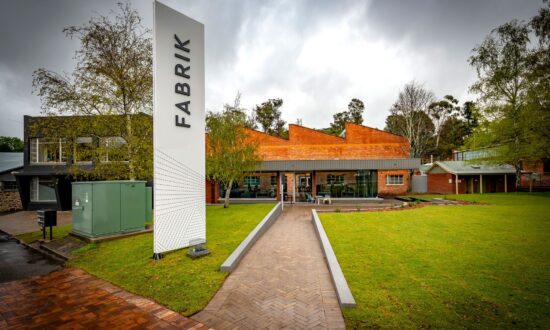Between 2014 and 2017, Australian-born Martinis Roe immersed herself within feminist groups in Barcelona, Milan, Paris, Sydney and Utrecht, documenting their practices and philosophies through film.
To Become Two is the result of this research project, a history from the 1970s onwards of these five female collectives, with each film a thesis of findings around 10 minutes’ long. The Samstag Scholar presents these as “parables” or “fables” from which viewers can draw their own meaning.
A sixth film, entitled Our Future Network, is a feature-length culmination of the lessons learned from the others, and is a candid sharing of 20 propositions that form a new feminist political practice. Each film has its own integrity, but presented together, they become a manifesto addressing the importance of inter-generational feminism and the relationships within it.
Working with Berlin-based designer Fotini Lazaridou-Hatzigoga, Martinis Roe presents these films, together with a selection of artefacts and posters, in an installation that gently unfolds throughout the gallery at Samstag. The arrangement presents each film as an island, allowing viewers the space to walk around each one, reflecting on the projection from all angles while examining the artefacts, such as photos, books and ornaments.
The modular structures framing the projections are made of the kind of metal often found in garages alongside tools – a material usually associated with masculinity. The decision to paint them purple softens the display, inverting the gendered imagery, and the structures’ DIY quality makes the Samstag feel like an “activist’s space”.

To Become Two: Visitors never feel alone while absorbing the work. Photo: Sam Noonan
Chairs borrowed from feminist collectives throughout South Australia are arranged in pairs in front of each film as a welcoming gesture to audiences, allowing them to participate in the exhibition by connecting with local feminist history. Having seats side-by-side encourages viewers to relate to the work next to a friend or, if they are alone, to consider who they could be watching it with.
While watching one film, the movements of others captured in peripheral vision is a particular pleasure; as you stand in front of one film showing the theatrical interactions between members of a women’s studies group at the University of Utrecht, another plays across the room of women translating stories in different languages by passing a microphone between them, sharing a single vessel that amplifies their voices. This layout fills the Samstag with the warmth of people and stories, meaning viewers never feel alone in the gallery.

Alex Martinis Roe’s installation also includes a number of artefacts. Photo: Sam Noonan
The title of this exhibition references French philosopher Luce Irigaray’s book To Be Two, which examines the irreducible difference between “woman” and “man”. By adding “Become”, Martinis Roe highlights how “woman” and “man” are constantly developing identities. The title challenges the character of intimate relationships, where two people fuse together to become one, erasing the differences between them. Rather, Martinis Roe suggests we need to commit to each other while maintaining our differences, joining “to become two”.
The final film in the installation, Our Future Network, speaks to the zeitgeist, drawing on themes that play out in every corner of society that encounters gender politics, such as government, sport, education, leadership, and care-labour. For example, Proposition #7, entitled “Productive Refusals”, expands on a woman’s ability to say no without “lubricating the denial, internalising the emotion of rejection” – a nuanced yet widespread experience for women across generations.

Our Future Network – a film still of the proposition ‘Productive Refusals’, developed in collaboration with Helena Reckitt, 2016.
Our Future Network also discusses the kitchen as a political space, linking to broader ideas of care-labour and how feminism has not necessarily produced linear results. While women in politics or on the world stage have grown to have greater public visibility, there is now less respect for those who undertake care-labour. This is seen as a regression, as women who chose to stay at home now have less social status. To challenge this inequality, Martinis Roe proposes that we need to grant mutual respect to the differences between us in our relationships, allowing for at least two different narratives instead of forming one universal character of “woman”.
The care taken in creating To Become Two leaves a lasting impact. There are posters, with a rubber band for convenience, stacked beside the screening of Our Future Network to take home as a reminder of these women’s manifesto, and to encourage future participation in the ideals of To Become Two.
Martinis Roe considers the creation of grassroots relationships to be a political act. To Become Two reminds us that while we are disparate, we are ultimately interdependent. It is a persuasive call to all women, asking for mutual acknowledgement and a commitment to one another.

Installation view: Chairs borrowed from feminist collectives throughout SA are arranged in front of each film in Alex Martinis Roe’s To Become Two. Photo: Sam Noonan
To Become Two is at the Samstag Museum of Art until September 24.
Michelle Wakim is the first recipient of the Helpmann Academy InReview Mentorship. She is working with experienced writers Samela Harris (theatre) and Katherine Tamiko Arguile (visual arts) to write a series of articles for publication in InReview.
Support local arts journalism
Your support will help us continue the important work of InReview in publishing free professional journalism that celebrates, interrogates and amplifies arts and culture in South Australia.
Donate Here




